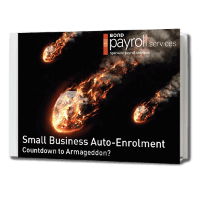20th January 2016
 In January 2016, an estimated 135,000 small businesses are due to take part in the auto-enrolment (AE) process. While this first tranche of organisations with 30 employees or fewer staging is a significant number, it is just the beginning, with 1.3 million micro businesses set to stage over the next two years.
In January 2016, an estimated 135,000 small businesses are due to take part in the auto-enrolment (AE) process. While this first tranche of organisations with 30 employees or fewer staging is a significant number, it is just the beginning, with 1.3 million micro businesses set to stage over the next two years.
However, the vast majority of industry figures expect large numbers of employers to miss their staging deadline. This can be put down to a number of reasons – from inertia to misinformation but also a very real question about how companies will fund AE.
Now that every company has a staging date, it is time to look closely at the way SMEs are approaching this new pensions requirement and question why there is still so much inertia and confusion around auto-enrolment.
At the recent Capacity Crunch Conference, Neil Esslemont, head of industry liaison for The Pension Regulator (TPR) and Payroll World columnist, told the conference that TPR is taking steps to ensure small and micro employers are aware of their duties, using methods such as television advertising.
The conference also saw the unveiling of a manual developed by the Friends of Automatic Enrolment (FoAE) to help small and micro businesses comply with workplace pension’s law. This could suggest that small businesses are becoming better informed but there are still many issues to address.
According to the Centre for Economics and Business Research (CEBR), larger employers required up to 103 days to get ready to stage. It is critical for SMEs to understand how long the staging process will take for smaller companies.
Certainly the AE process has been streamlined to a degree and smaller employers should be able to manage some aspects, such as employee communication, more quickly. However, a current rumour that SMEs will only require 20 days on average to stage is just dangerous. Furthermore there is a shortage of providers willing or able to work with less profitable SMEs which will affect how smaller businesses are able to work to solve the current crisis.
The cost of AE is another area that is raising significant concerns within the industry due to a lack of understanding regarding the up front and on-going business investment required. According to industry commentary, AE costs are estimated to be £8,900 per small business. However, 40% of the UK’s smallest businesses either don’t know or don’t think it will cost anything to set up. A further 11% think it will only cost up to £5,000. Disturbingly, 34% of small companies are considering capping salaries and cutting bonuses and 11% plan to raid other benefits to offset the cost of pension provision.
This lack of understanding and attendant risk of underinvestment could jeopardise the whole concept of pension provision – with a knock on effect on employee morale.
With a staging date in hand it is now essential for small businesses to consider the way AE is to be funded without compromising existing salary and bonus schemes.
In the next blog of this two part series we continue to look at how AE will affect the SME, the qualification process and the costs associated for employers.


